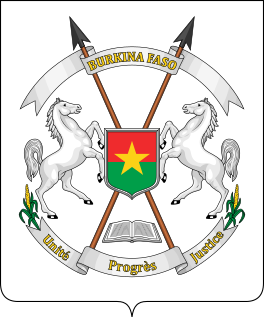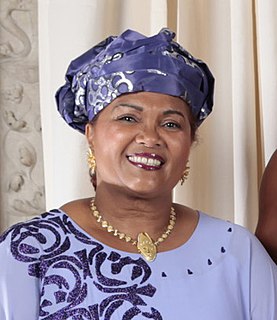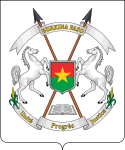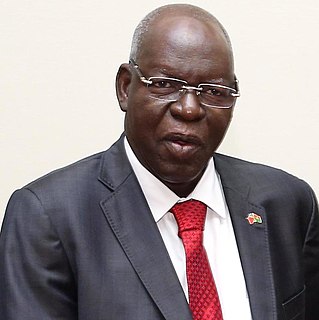
The Politics of Burkina Faso takes place in a framework of a semi-presidential republic, whereby the Prime Minister of Burkina Faso is the head of government, and of a multi-party system. The President of Burkina Faso is the head of state. Executive power is exercised by both the President and the Government. Legislative power is vested in both the government and parliament. The party system was dominated by the Congress for Democracy and Progress (CDP) until the 2014 Burkinabé uprising. Since then, the CDP has lost influence. The Judiciary is independent of the executive and the legislature. The Economist Intelligence Unit rated Burkina Faso as a "hybrid regime" in 2016.

The history of Burkina Faso includes the history of various kingdoms within the country, such as the Mossi kingdoms, as well as the later French colonisation of the territory and its independence as the Republic of Upper Volta in 1960.

The Congress for Democracy and Progress was the ruling political party in Burkina Faso until the overthrow of Blaise Compaoré in the year 2014.

Roch Marc Christian Kaboré is a Burkinabé politician and banker and the President of Burkina Faso, in office since 2015. Previously he served as the Prime Minister of Burkina Faso between 1994 and 1996 and President of the National Assembly of Burkina Faso from 2002 to 2012. He also served as President of the Congress for Democracy and Progress (CDP). In January 2014, he left the ruling CDP and joined a new opposition party, the People's Movement for Progress.

Change 2005 was a political alliance in Burkina Faso, founded to contest the presidential election in 2005. The incumbent, Blaise Compaore, was standing for a third term and was expected to win despite claims that another term in office would be unconstitutional. He was re-elected with 80.35% of the votes.
Gilbert Noël Ouédraogo is a Burkinabé politician who has been President of the Alliance for Democracy and Federation–African Democratic Rally (ADF-RDA), a political party in Burkina Faso, since 2003. He served in the government of Burkina Faso as Minister of Social Action and National Solidarity from 2000 to 2002 and as Minister of Transport from 2006 to 2013. He was the Fourth Vice-President of the National Assembly of Burkina Faso from 2013 to 2014.

Chantal Compaoré, born Chantal Terrasson de Fougères is the Franco-Ivorian wife of former President Blaise Compaoré of Burkina Faso. Born in the Ivory Coast, after becoming the First Lady in 1987 she spent much of her time on charity work in Burkina Faso. Her husband, who came to power in a bloody 1987 military coup, was overthrown in the 2014 Burkinabé uprising. Chantal Compaoré was subsequently forced to flee to her home country, going into exile together with her husband.
Articles related to Burkina Faso include:

Presidential elections were held in Burkina Faso on 21 November 2010. Incumbent president Blaise Compaoré was re-elected with 80% of the vote. The elections were marred by claims of widespread fraud.

Parliamentary elections were held in Burkina Faso on 2 December 2012. They were the first elections held since the National Assembly dissolved the National Electoral Commission in 2011, following fraud allegations concerning the 2010 presidential elections. Municipal elections for over 18,000 councillors were held simultaneously. The elections were held amidst a period of political uncertainty, following protests against President Blaise Compaore's regime.
Sankarism is a term sometimes applied to denote a left-wing ideological trend within the political milieu of Burkina Faso, a landlocked country in West Africa, as well as the policies of the military government led by Captain Thomas Sankara. Sankara came to power in what was then the Republic of Upper Volta in a popularly-supported 1983 military coup, and ruled until his assassination in a coup led by Blaise Compaoré in 1987.

General elections were held in Burkina Faso on 29 November 2015. The elections were the first national elections in the country since the 2014 Burkinabé uprising and the departure of President Blaise Compaoré, who had ruled Burkina Faso for 27 years. The party of former President Compaoré, the Congress for Democracy and Progress, was banned from running a presidential candidate but was still able to participate in the parliamentary election.

The Burkinabé uprising was a series of demonstrations and riots in Burkina Faso in October 2014 that quickly spread to multiple cities. They began in response to attempts at changing the constitution to allow President Blaise Compaoré to run again and extend his 27 years in office. Pressure for political change came from civil society and in particular from the country’s youth. Following a tumultuous day on 30 October, which included the involvement of former Defence Minister Kouamé Lougué and the burning of the National Assembly and other government buildings as well as the ruling Congress for Democracy and Progress party's headquarters, Compaoré dissolved the government and declared a state of emergency before eventually fleeing to Côte d'Ivoire with the support of President Alassane Ouattara.
The Republican Front was a coalition of political parties in Burkina Faso. The coalition was launched on January 23, 2014 at a conference held at Hotel Splendid in the capital Ouagadougou. Some forty political parties took part in the foundation of the coalition. The coalition emerged in response to popular protests against reform of Article 37. The coalition supported holding a referendum on Article 37 of the Constitution, which would have enabled the president Blaise Compaoré took be re-elected. Amongst the leaders present at the founding of the Republican Front were Assimi Kouanda, Alain Zoubga, Ram Ouédraogo, Hermann Yaméogo, Maxime Kaboré, Toussaint Abel Coulibaly and Diemdoda Dicko (CFD).
The 1982 Upper Voltan coup d'état took place in the Republic of Upper Volta on 7 November 1982. The coup, led by the little-known Colonel Gabriel Yoryan Somé and a slew of other junior officers within the military, many of them political radicals, overthrew the regime of Colonel Saye Zerbo. Zerbo had previously taken power just under two years prior to his own downfall.
The 2003 Burkinabé coup d'état attempt was an alleged plot in the landlocked African country Burkina Faso that took place in October 2003. The attempted coup was carried out against long-time strongman President Blaise Compaoré and his Congress for Democracy and Progress regime, and resulted in the imprisonment of several members of the armed forces and political dissidents. Over a decade later, Compaoré would finally be overthrown in the 2014 Burkinabé uprising.











